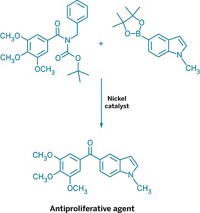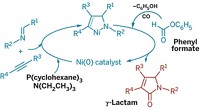Advertisement
Grab your lab coat. Let's get started
Welcome!
Welcome!
Create an account below to get 6 C&EN articles per month, receive newsletters and more - all free.
It seems this is your first time logging in online. Please enter the following information to continue.
As an ACS member you automatically get access to this site. All we need is few more details to create your reading experience.
Not you? Sign in with a different account.
Not you? Sign in with a different account.
ERROR 1
ERROR 1
ERROR 2
ERROR 2
ERROR 2
ERROR 2
ERROR 2
Password and Confirm password must match.
If you have an ACS member number, please enter it here so we can link this account to your membership. (optional)
ERROR 2
ACS values your privacy. By submitting your information, you are gaining access to C&EN and subscribing to our weekly newsletter. We use the information you provide to make your reading experience better, and we will never sell your data to third party members.
Synthesis
About-Face For Hydroformylations
Chemists develop a reverse hydroformylation method that deconstructs aldehydes to make alkenes
by Stephen K. Ritter
January 5, 2015
| A version of this story appeared in
Volume 93, Issue 1
The hydroformylation reaction, also known as the oxo process, is a key industrial route for converting alkenes, CO, and H2 into aldehydes that serve as intermediates to make a variety of chemical products. Chemists have now figured out a way to turn the reaction around and undo hydroformylations under mild conditions without involving gaseous reagents, rendering aldehydes into alkene derivatives (Science 2015, DOI: 10.1126/science.1261232). Why anyone would want to do such a thing is not at first intuitive, but Stephen K. Murphy, Vy M. Dong, and colleagues of the University of California, Irvine, offer the method as a new option for modifying complex molecules in pharmaceutical research. For example, enzyme-mediated dehydroformylation of aldehydes to generate alkenes occurs during the biosynthesis of sterols such as cholesterol. The UC Irvine researchers thought they could mimic that process, but it required designing a transition-metal catalyst to trigger C–C bond cleavage by selective activation of the aldehyde C–H bond. Their rhodium(Xantphos)(benzoate) catalyst does that while transferring a formyl group and hydride from the aldehyde to an added strained olefin receptor such as norbornene. The team tested the reaction on a set of benzyl aldehydes as well as on conversion of the natural product stimulant (+)-yohimbine to (+)-yohimbenone.





Join the conversation
Contact the reporter
Submit a Letter to the Editor for publication
Engage with us on Twitter